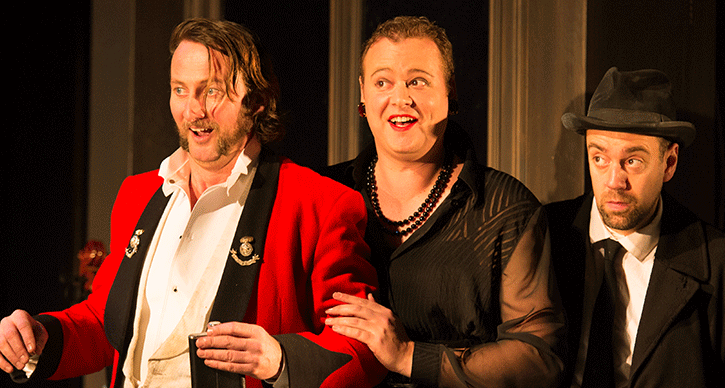Propeller Blog: Hauntings
Editor’s Note: Propeller performs Twelfth Night and The Taming of the Shrew in Ann Arbor, February 20-23. Leslie Stainton covered the company’s last visit to Ann Arbor in 2011 with Richard III. This post is a part of a series.

Photo: Twelfth Night. Photo by Manuel Harlan.
“Everything in the theatre, the bodies, the materials utilized, the language, the space itself, is now and has always been haunted, and that haunting has been an essential part of the theatre’s meaning to and reception by its audiences in all times and all places.” —Marvin Carlson, The Haunted Stage: The Theatre as Memory Machine
Among the ghosts I detected onstage Wednesday night—images and actions that reminded me of the last time I saw this company at work, here in Ann Arbor in 2011—were:
- Music—not recorded but performed onstage by the ensemble on an eclectic range of instruments, among them cello, clarinet, sax, bongo, wine glass and balloon
- Acoustic sound—no miked voices, thank god
- Chorus—the company is, for the most part, onstage throughout the show, donning half-masks to function collectively as both witnesses of and ghostly participants in the story
- Men playing women—I’d forgotten the unsettling pleasure of watching one gender impersonate the other (and, in the case of Viola-Cesario, male playing female playing male); this is how Shakespeare meant his plays to be seen, and while I don’t always love it, there is, as one actor said in last night’s post-show talkback, a “layering” that speaks to the ways we each layer ourselves in guises
- A quality of low-tech and handmade—of course this isn’t literally true (the show is designed and lit and costumed within an inch of its life), but you get the sensation this troupe of players has rather spontaneously come together on a platform to tell you a story, and they’re going to do it by hand, converting wardrobes into rooms, turning a chest of drawers on its side to function as a bar, picking up whatever musical instrument is at hand, grabbing costumes and props from a clothing rack, creating bird song with their own voices, acting out a tale as if they were kids in a playroom making their toys talk
- Syringe—remember Richard III with its sinister band of nurses? It came back in a flash last night when Sir Toby Belch produced a giant syringe to sedate Malvolio
There’s another way in which this production of Twelfth Night reminded me of Propeller’s last visit, and that’s the way it seemed to blend both previous productions—the somber, monochromatic Richard III and the zany Comedy of Errors—into a single show, at once monochromatic and zany. I’ve never seen a darker Twelfth Night, or a bleaker take on any Shakespeare comedy. Picture a score of actors, almost all of them in black, on a gray stage with sepia furnishings against a thundery sky. I kept waiting for unadulterated comedy to erupt from this gloomy space, and of course it did, but mostly in quick, jabbing bursts, and always with an edge.
And that’s as it should be, said actor Joseph Chance (Viola-Cesario) during last night’s post-show talkback. “There’s a lot of violence behind the play,” Chance told the hundred or so audience members who’d stayed behind to discuss the production with cast members. (I recommend it—and I’m not a big fan of talkbacks. There’s a second one tonight after Shrew.)
Malvolio’s humiliation is hilarious but also deeply cruel, Chance went on. It’s painful to behold. The ending of the comedy is not wholly sweet. Chance said he thinks this all “has a lot to do with Shakespeare’s ability to last through the years. He doesn’t pander.” The play is not unabashedly romantic, nor is it purely tragic—like life, it’s a mingling of both. When characters wonder if they’re going mad, they’re not being cute. There’s a real chance they are—and we literally hear that madness as it threatens to envelop them.
Here’s what assistant director George Ransley has to say about all this:
Caro McKay told me the other day that Shrew was the darker of the two plays on offer at Power. Now that I’ve seen Twelfth Night, I’m wondering how that’ll play out onstage. All I know is what actor Ben Allen said last night: “This show is monochrome. Shrew is disco lights like you’ve never had. It’s like drinking 10 espressos.”






